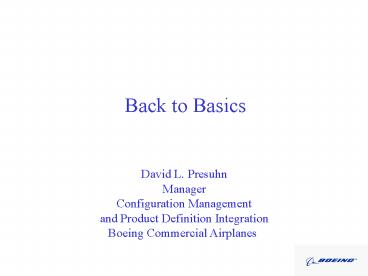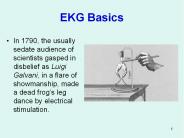Back to Basics - PowerPoint PPT Presentation
1 / 21
Title: Back to Basics
1
Back to Basics
David L. Presuhn Manager Configuration
Management and Product Definition
Integration Boeing Commercial Airplanes
2
A word from our sponsor
3
First master the fundamentals
Throw the ball Catch the ball Hit the ball Run
the bases
Then learn to execute the double play and the
suicide squeeze!
4
The fundamentals of our product
Lift
Drag
Thrust
Gravity
Comprised of 2 million parts flying in close
formation
5
The achievement of the Wright brothers is not so
much powered flight, but controlled powered flight
6
Execution of the fundamentals combined with
minimum essential controls is the basis for
process stability and improvement.
7
Skilled and motivated workforce
Product Improvements Technology
Improvements Process Improvements
Legacy Processes
Outdated Paradigms
Our Environment
Economic and Political trauma
8
Process Fundamentals
- Well understood requirements
- Process documentation appropriate to the users
- Minimum essential controls
- Skilled and motivated workforce
- Continuous improvement
9
Configuration Management Requirements
- Planning and Management
- Configuration Identification
- Configuration Change Management
- Configuration Status Accounting
- Configuration Verification
10
(No Transcript)
11
(No Transcript)
12
(No Transcript)
13
Engineering Documentation
- Documents must be aligned to the Process Index
and approved by the assigned process owner to be
maintained. - Requests for document creation/changes are sent
to the Engineering Documentation Group.
14
Issues Management System (IMS)
- Provides a single vehicle for compiling,
monitoring, and resolving business process issues
and changes related to improvement of processes
for all Engineering organizations. - Issues may address ideas, suggestions, or
problems related to processes, documentation, or
systems hardware or software. - Issues may originate from any end user
(initiator), but are submitted only by IMS
process subject matter experts who represent the
participating groups or organizations.
15
Workgroup Self-Assessment (WSA)
- In general, the self-assessment process promotes
the following - Personal and workgroup knowledge of and
compliance with documented requirements. - Process effectiveness.
- Identification of compliance issues.
- Process maturity.
- Process management.
- Specifically, workgroup self-assessment promotes
the following - Process management and improvement.
- Data generation and collection on process
effectiveness, process issues, and process
discipline at the workgroup level for the
products they produce. - Awareness of compliance with company, statutory,
regulatory, and configuration management
standards and requirements. - Reduction and elimination of redundancy in
processes and procedures. - Verification and adherence to documented
processes. - Audit readiness.
16
(No Transcript)
17
Engineering Quality Assessment (EQA)
- Help BCA Engineering succeed through independent
assessment of engineering projects and processes - Periodic assessment of process health
- Specific assessment of identified projects
- Development of engineering employees through EQA
experience - Provide foundation for transition to delegated
organization - EQA functions
- Fact finding assessment
- Non-Advocate independent review
- Consultation
18
EQA on CMMI Specific Practices
- SP 1.1-1 Objectively Evaluate Processes
- SP 1.2-1 Objectively Evaluate Work Products
and Services - SP 2.1-1 Communicate and Ensure Resolution of
Non-compliance Issues - SP 2.2-1 Establish Records
19
EQA on CMMI Generic Practices
- GP 2.1 Establish an Organizational Policy
- GP2.2 Plan the Process
- GP2.3 Provide Resources
- GP2.4 Assign Responsibility
- GP2.5 Train People
- GP2.6 Manage Configurations
- GP2.7 Identify and Involve Relevant
Stakeholders - GP2.8 Monitor and Control the Process
- GP2.9 Objectively Evaluate Adherence
- GP2.10 Review Status with Higher Level
Management - GP3.1 Establish a Defined Process
- GP3.2 Collect Improvement Information
- GP4.1 Establish Quantitative Objectives for
the Process - GP4.2 Stabilize Sub-process Performance
- GP5.1 Ensure Continuous Process Improvement
- GP5.2 Correct Root Cause of Problems
20
Lean tactics simplify processes
- Understand how value flows
- Standardize work procedures
- Put visual controls in place
- Put everything at point of use
- Radically redesign products and business
processes
(value stream mapping)
(Spread work evenly over the system)
(Checklists)
(Process metrics)
21
Complexity is not inherently evil, but complex
systems fail in complex ways.
Making anything simpler requires hard work.
Back to Basics































